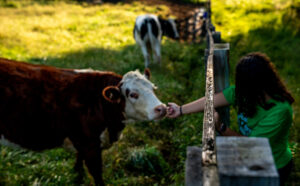CHEVY CHASE, MD (April 13, 2022) - A new survey by National 4-H Council and the Harris Poll exploring teens' perceptions and attitudes about the environment found that across demographic groups, 75 percent of Gen Z teens in the U.S. are worried about the future of the planet.
An overwhelming 84 percent of teens agree that if climate change is not addressed today, it will be too late for coming generations and make parts of the planet unlivable. This impacts how they view their own futures, with 84 percent of Gen Z respondents indicating that the effects of climate change will lead to global political instability and 69 percent of teens expressing worries that they and their families will be personally affected by climate change through floods, fires, and extreme heat in the near future.
"This survey reinforces that climate change is among the most urgent issues facing youth today," said Jennifer Sirangelo, President and CEO of National 4-H Council. "Gen Z has experienced historic weather events and climate concerns firsthand, and they are channeling their worries into innovative solutions in their backyards and the world," added Sirangelo. "Cooperative Extension's 4-H program is committed to lifting up youth voices and empowering young people to help their communities achieve a brighter and more environmentally secure future."
Teens feel empowered to take action with 84 percent expressing a desire to be involved in shaping the future success of the planet. Yet they believe everyone is equally responsible for protecting and preserving the environment and that political and business leaders are falling short. The vast majority of teens (84 percent) agree that we need more action from companies on addressing climate issues, and 83 percent of teens want to see more legislative action from the government.
"The future of the Mississippi River is concerning because it is the lifeline to not only Louisiana industries and ecosystems, but also to the entire country," said Louisiana 4-H'er Izzy Dean. "If the Mississippi River and its deltas continue to experience pollution, nutrient runoff, and levees blocking the reintroduction of soil deposits to the floodplains, there will be detrimental impacts for the environment and future generations of humanity," added Dean. "I hope that my soon-to-be career as a coastal environmental scientist can address these concerns by figuring out solutions to mitigate subsidence, restore disappearing habitats, and work to fix the many other problems that plague this very important, yet very fragile, river and watershed."
The survey also found that Gen Z is concerned not just about their own individual futures when it comes to climate change, but on the future of life as we know it. Indeed, 84 percent of teens are worried that if we don't do more to protect the environment now, humans, along with wildlife and other species, will suffer and possibly go extinct.
"For generations, 4-H'ers have recited the 4-H pledge, 'pledging their hands to larger service.' The current generation faces severe environmental challenges with great concern and even greater hope," said Dave Francis, Director of Extension & 4-H Youth Programs for Utah State University Extension. "These young leaders know they can make a difference and are willing to extend great effort to drive change in their local communities to impact the world."
The survey polled 1,500 respondents between the ages of 13-19 nationwide. Data was collected and analyzed on a variety of factors including gender, age, race, urbanicity, and 4-H involvement. The full survey results can be viewed at 4-H.org.
Contact:
Julia Majors, National 4-H Council
jmajors@fourhcouncil.edu
202-262-1782
About 4-H
4-H, the nation's largest youth development organization, grows confident young people who are empowered for life today and prepared for careers tomorrow. 4-H programs empower nearly six million young people across the U.S. through experiences that develop critical life skills. 4-H is the youth development program of our nation's Cooperative Extension System and USDA and serves every county and parish in the U.S. through a network of 110 public universities and more than 3000 local Extension offices. Globally, 4-H collaborates with independent programs to empower one million youth in 50 countries. The research-backed 4-H experience grows young people who are four times more likely to contribute to their communities; two times more likely to make healthier choices; two times more likely to be civically active; and two times more likely to participate in STEM programs. Learn more about 4‑H at 4-H.org and follow us on Facebook, Instagram, and Twitter.
















